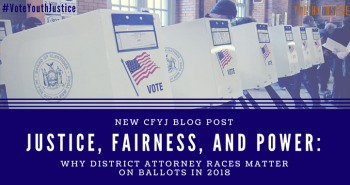Justice, Fairness, and Power: Why District Attorney Races Matter on Ballots in 2018

By Gianna Nitti, Public Interest Communications and State Campaigns Fellow
In our country one of the elected officials that holds the most power, and often for long terms, is the District Attorney (alternative titles include commonwealth's attorney in Kentucky and Virginia, state's or county attorney in Connecticut, Florida, Illinois, Maryland, North Dakota, South Dakota, and Vermont, and circuit solicitor in South Carolina). DA’s have a crucial role in the criminal justice system – they are responsible for deciding whether or not to prosecute a case and the level of charges and sentences that they are going to pursue.
Unfortunately, 85 percent of DA’s run unopposed, and there are many who have “tough-on-crime” beliefs, which are increasingly being promoted by the likes of Attorney General Jeff Sessions. These beliefs have a negative impact on those who come in contact with the criminal justice system, especially youth, as well as on public safety through higher recidivism rates.
Fortunately, voters seem to be paying closer attention. There has been a surge of long-term incumbents being ousted from these positions; notably, in the recent Texas primaries twelve DA’s faced opponents with six losing their elections. More reform-minded candidates are winning DA elections in some important jurisdictions.
A case in which is apparent is in Jacksonville, Fla., where State Attorney Melissa Nelson, elected in 2016, recently released a report describing the progress she has made after a little more than a year in her position. She has been embracing alternatives to harsh sentencing, such as adult and teen drug courts, and mental health courts which have a focus on rehabilitation instead of simply punishment. Nelson has embraced alternative to arrest methods for juveniles, which results in less children entering the system and gives them a better chance at a successful future.
Aramis Ayala, also elected in 2016, is the state attorney for the Orlando-area judicial circuit, and she is Florida’s first African American state attorney. While she has faced push-pack from her opponents, she has focused on reforming the criminal justice system and addressing its racial disparities. Since she was elected she has been particularly focused on limiting use of the death penalty and she has started an initiative to ensure that when juveniles are stopped by police but not charged with a crime, it will not be put on their permanent record. This allows for juveniles to have a better chance at success and potentially avoid further problems with the criminal justice system.
Another major city, Philadelphia, has seen a major shift in their DA, bringing a change of perspective that goes beyond prosecuting to also include protecting people from criminal justice system overreach. In 2017, they elected Larry Krasner, who had spent his career fighting corruption as a defense attorney. Similar to Nelson in Jacksonville, he wants to treat drug and mental health concerns as a medical condition, instead of punishing people. While campaigning, he addressed Philadelphia’s high incarceration rate, which is four times higher than New York City. and he promised to reduce the number of incarcerated individuals, never use the death penalty, and put an end to cash bail. He is also believed to favor finding a way to get youth under 18 out of Philadelphia’s adult jails.
And in St. Louis, there is Circuit Attorney Kimberly Gardner, who was elected in January 2017. She has created The Felony Redirect Program for those under her jurisdiction. This allows for deferred sentencing for nonviolent felony offenders with little criminal history. Redirecting people out of prisons and jails can reduce recidivism, and it keeps people in their communities where they can retain their jobs and stay with their families. Offenders in the program will participate in behavior modification, education, job skills training, and community service instead of entering the criminal justice system, giving them a better chance to become successful and productive in society.
This year will have more than 1000 elections for DA races on the ballot across the country, so make sure to go out and vote for DAs with forward thinking policies, and a focus on alternatives to incarceration, especially for youth. In 2018, remember to #VoteYouthJustice.

